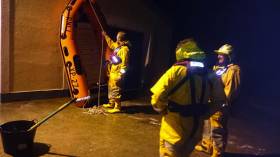Displaying items by tag: Killary Fjord
#RNLI - Achill RNLI was requested late on Thursday night (5 January) to help locate and rescue two adult male hill walkers who were in distress in the vicinity of Mweelrea mountain in Killary Fjord, Connemara.
The Irish Coast Guard helicopter was unable to operate because of low visibility, so in a joint operation, Achill RNLI, Mayo Mountain Rescue and Westport Coast Guard combined forces to effect a very challenging rescue.
Achill RNLI’s lifeboat crew were able to locate the hill walkers on the steep cliff face near Rossroe Harbour and then deployed their XP boat, a small dinghy, to transfer seven members of the Mayo Mountain Rescue Team to the cliff face in very difficult conditions.
The mountain rescue team was then able to reach the two people and gradually bring them down the 200ft or so of the cliff face, where Achill RNLI’s crew could ferry them to the waiting lifeboat, The Sam and Ada Moody.
In a lengthy operation under low cloud, fog, rain and gusty winds the Achill RNLI crew went between the water and cliff ferrying the mountain rescue team and the hill walkers back to the lifeboat where the casualties were given first aid treatment before transfer to Rossroe Pier.
There they were handed over to the care of Westport Coast Guard, after suffering from hypothermia and exhaustion.
Achill RNLI coxswain Dave Curtis described the condition of the rescued men as “cold, wet and miserable” and the weather conditions as extremely difficult.
Speaking following the callout, Achill RNLI mechanic Stephen McNulty said: “This was a great example of teamwork between the different rescue agencies.
“The voluntary crew of Achill RNLI is always ready for call out and this is where the training and commitment across the team really pays off. A happy ending is what we always hope for and thankfully that was the case last night.”
Of the two men rescued from the cliff face, McNulty said: “They enjoyed a nice cup of soup on board the Achill RNLI lifeboat – I’m sure it seemed like the best soup they had ever tasted!”
After some eight hours, the Achill RNLI crew arrived back at the lifeboat station around 06.30am on Friday morning (6 January).






























































